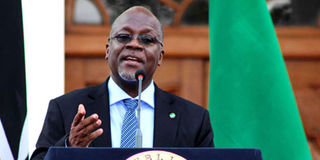As Magufuli exits, Tanzania lives on

Tanzania President John Magufuli.
What you need to know:
- Magufuli had a will like a tractor, battering an entire nation into obedience with the sheer force of his personality.
- But at times he appeared bashful, almost timid, especially when navigating the intricacies of foreign diplomacy.
President John Pombe Joseph Magufuli was a paradox. In one sense, he was the archetypal Tanzanian politician: Homegrown, locally educated, trained and indoctrinated into Chama Cha Mapinduzi, almost instinctively suspicious of foreign influences laced with a palpable dislike for the northern neighbour.
On the other hand, he lacked what makes Tanzanian politicians, and Tanzanians in general, so attractive to Kenyans: A silver tongue, consummate politeness and ability to debate and argue endlessly with fluid civility.
He had a will like a tractor, battering an entire nation into obedience with the sheer force of his personality. But at times he appeared bashful, almost timid, especially when navigating the intricacies of foreign, and especially Western, diplomacy.
He loved his country passionately and volubly. But he mistook his own feelings and thoughts for the interests of the nation. I think he truly believed, as a man trained in the sciences, that the coronavirus was neither here nor there and that the country was better off ignoring it and preserving its economy. But he never allowed himself to be persuaded by the arguments of other scientists, many of whom, I believe, were as patriotic as he.
It is impossible to establish the exact circumstances of Tanzania where Covid is concerned. It is, therefore, not possible to really say whether the countries that took a more conventional approach of lockdowns and vaccines are better off. But there is anecdotal evidence of significant loss of life, possibly even the President’s.
There is no denying that President Magufuli’s nationalistic populism made him a popular figure among ordinary people not just in Tanzania but also other parts of East Africa. They liked the sight of the arrogant powerful being reduced to a trembling mess in one of his frequent public humiliations of the high and mighty. And Dr Magufuli was a “sack-happy” boss, in the sense of a trigger-happy gunman; barely a day went by without an announcement from State House that an official “ametenguliwa”, Swahili for being shown the door.
New leadership
Hand it to him, he had a highly developed sense of project management, an ability to whip and scare the daylights out of contractors and shove them into delivering on jobs. He was confident that he had done a good job of contracting the Tanzanian SGR and that the folks here had done a bad job of it and he probably was right, given our ballooning costs.
Many Tanzanians believe their country is a Garden of Eden, with abundant natural wealth and beauty, and it is true. But you need capital, entrepreneurship and human resource to convert natural wealth into usable money. That means foreign commercial interests have to be managed in ways that can be demonstrated to be fair and lawful.
President Magufuli’s ideology and policies were Tanzania-friendly but not necessarily business-friendly. And international capital and know-how can make Tanzania truly wealthy, especially if it is led by a President who will not allow international extractive interests from robbing the country blind.
However, President Magufuli’s nationalism pushed him to a level where he failed to realise that Tanzania, too, had international and regional interests. His government’s decision to round up and auction cattle belonging to Kenyan Maasai herders which had crossed the international border was petty. They have grazed those lands for hundreds of years. And the burning of chicks from Kenya over some dispute or other was the trade equivalent of chopping hands by rebel groups to enforce conformity: Needlessly brutal when more humane ways abound to achieve that.
Tanzania now has massive trade interests in the region. Its agriculture enjoys huge comparative advantage against Kenya and some other neighbours. It has lots of land, labour and a trading class that is able to take its products to every corner. For perishables such as food, geography is king. We may have very low costs of production in Africa but it is cheaper for the United Arab Emirates to obtain food from Pakistan as it is next door and transport costs are lower. Similarly, Tanzanian food traders will find it a lot easier to do business in Isiolo than in Durban, however much Tanzania would rather trade with South Africa than Kenya.
I think there is a lot of goodwill in the region towards Tanzania and an outpouring of good wishes on the tragic loss of its President. How the news of his illness was handled and the extreme sensitivity around it is a different story. But like the Sunday Nation said in an editorial, there is no constitutional vacuum or political crisis in Tanzania. There is an opportunity for the new leadership to open a new, post-Magufuli chapter: To take a fresh look at how the country has managed public health, especially Covid-19, and the leaders’ health.
There is also an opportunity to prosecute its burgeoning trade interests more aggressively; to recognise that its neighbours, too, have legitimate trade interests; and renew relations with international business in a more convivial environment of mutuality and reciprocity. President Magufuli is gone. The Tanzanian nation — and its vital interests — is perennial.





